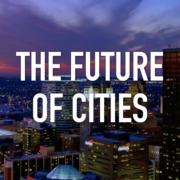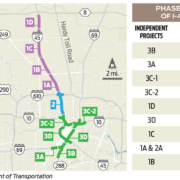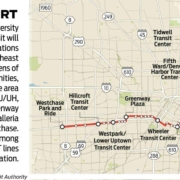‘Be Someone’ City Opportunity Urbanism Event and more
The lead item this week is a Houston event I’ll be speaking at Wednesday evening June 16th: Building a ‘Be Someone’ City: Houston and the Rise of Opportunity Urbanism:
“Cities have historically been the gateway to America and our nation’s promise of opportunity and upward mobility. Today, however, many of our nation’s highest profile cities have become ‘luxury products’ affordable only for the highest income earners. Houston and other ‘opportunity cities’ have historically bucked this trend by embracing policies that lower the cost of living, create jobs, and enhance the quality of life for all. But a continuation of this success is under threat from an array of proposed ‘command and control’ policies that will erode our city’s dynamism. Houston’s success is no accident, and it’s future is worth fighting for.
Join the Liberty Leadership Council and the Urban Reform Institute for a vibrant discussion of Houston’s market-centered, ‘people-oriented’ approach to urban policy, planning, and development.
We’ll talk zoning, transportation, infrastructure, housing, and everything in between—all while enjoying views of downtown and toasting the Bayou City.”
You can register here and I hope to see you there!
Moving on to this week’s items:
- City Journal: End of the Road for Parking Requirements – They serve as a tax on housing. Houston should pass a plan to automatically reduce parking minimums citywide by 8%/year – enough for real impact over time w/o public blowback. Why keep building parking that autonomous taxis will make obsolete in the 2030s or even sooner?
- Excerpts from a Market Urbanist Scott Beyer Facebook post after his most recent trip to Texas:
“Texas is already known for high econ freedom and autonomy from the feds. The more I learn, the more unique it seems on this front. Counties without zoning. Toll roads galore. Limited land handed to the feds. Independent not unified school districts. Separate energy grid. Higher speed limits. And I could go on. The governance here is truly different.
A culture of exceptionalism: Texas wants to be the best, and has built an unapologetic brand around it – “everything’s bigger in Texas.” Coastal urban America used to have that bravado, but is now overcome with Nimbyism and guilt-mongering.”
- MarketWatch: These 3 places in the U.S. are most at risk of being battered by a hurricane. Houston at moderate risk with a hurricane hit expected every 9 years, but not as bad as Miami, New Orleans, or North Carolina.
- Forbes: Miami Just Rolled Out Its Newest Red Carpet To The Tech World. Are San Francisco And Austin Paying Attention? Hat tip to Judah. I’d heard about the Miami tech push (I think their odds are better getting Wall Street). The REEF model is an interesting one, although probably not for Houston. It seems to be taking advantage of tight zoning in most cities to create new locations for businesses using parking lots, because those businesses can’t find a real location in certain neighborhoods. Houston’s lack of zoning means real locations are readily available in most areas.
- Houston real estate market leads nation with new homes on the market
“More permits (48,208) were issued last year for new-home construction in the Houston area than anywhere else in the U.S. DFW ranked second (43,884), and Austin held the No. 5 spot (21,653).”
- Houston and NOx and SOx – Companion Pollutants
- Drive & Listen: Wow this is super cool and mesmerizing. You can set the speed of the vehicle, street noise, music – even change radio stations while driving in 50 different cities around the world, spending as much time as you like in any one of them. Someone needs to do this for Houston!
Remember to register here. I hope to see you at the Opportunity Urbanism event!
This piece first appeared at Houston Strategies.
Tory Gattis is a Founding Senior Fellow with the Center for Opportunity Urbanism and co-authored the original study with noted urbanist Joel Kotkin and others, creating a city philosophy around upward social mobility for all citizens as an alternative to the popular smart growth, new urbanism, and creative class movements. He is also an editor of the Houston Strategies blog.









